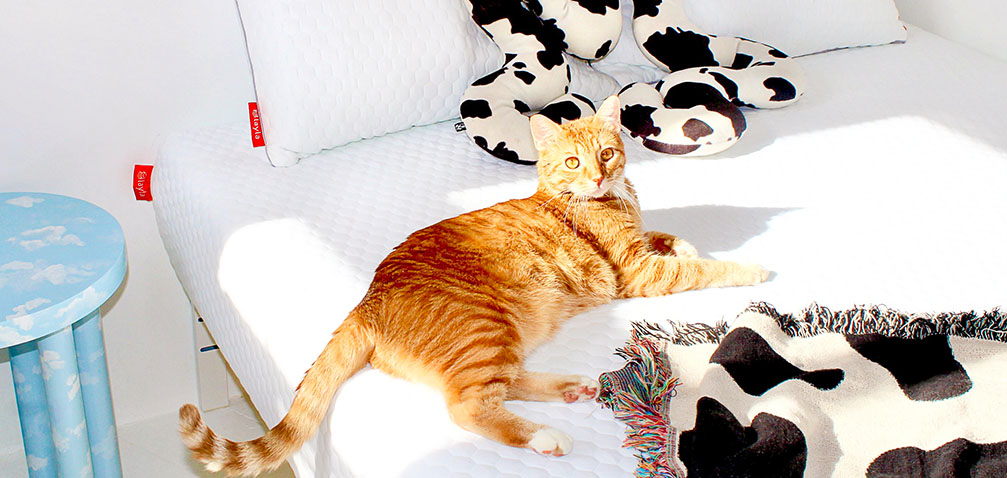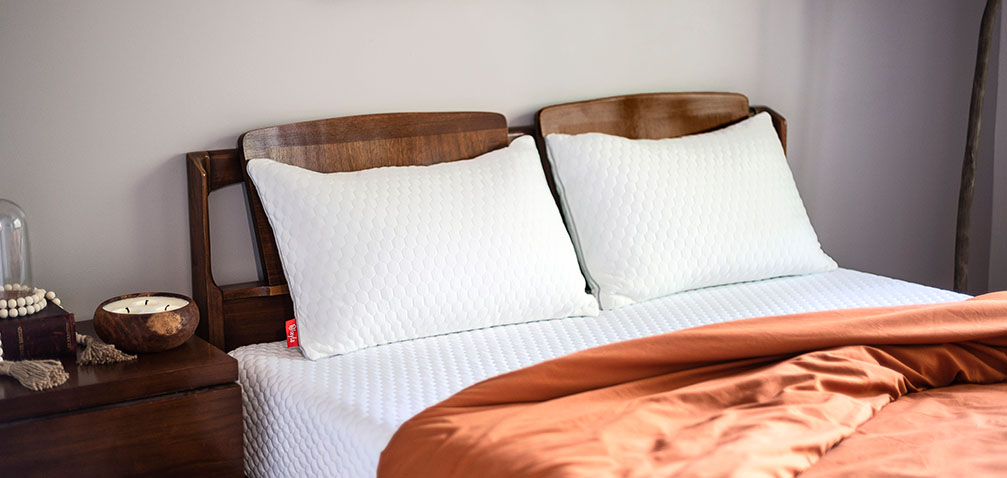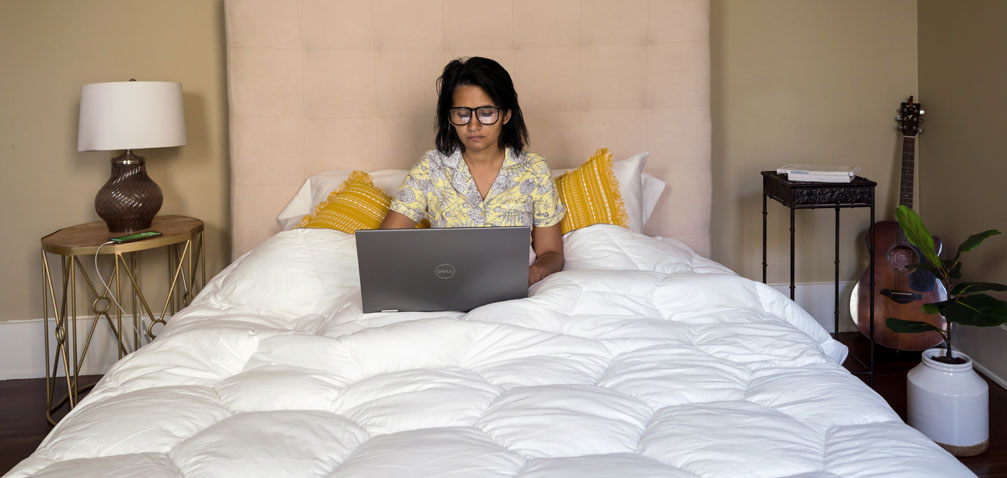- How to Prepare your Mattress for Deodorizing
- Mattress Deodorizing Techniques
- How to Maintain a Fresh-Smelling Mattress
- FAQs
- Wrapping Up: How to Deodorize a Mattress
How to Prepare your Mattress for Deodorizing
Before deodorizing a mattress, you should identify the cause of the odor. Unfortunately, many things can make your mattress smell, including sweat, spills, pets, and even mold. Unfortunately, sometimes you won’t be able to identify the cause. For example, if Fido had an accident in the bed, you can probably smell it and see the stain. However, if the odor is caused by sweat, you might not always see it when looking at your mattress. That said, knowing the cause can help you prevent a recurring odor. For example, if the smell is from sweat, you may consider showering before hopping into bed at night.
After identifying the cause, you can start preparing to deodorize your mattress by stripping and washing the bedding and vacuuming the mattress. Vacuuming the mattress is crucial because it can help remove any dust, dander, or crumbs lingering on your mattress.
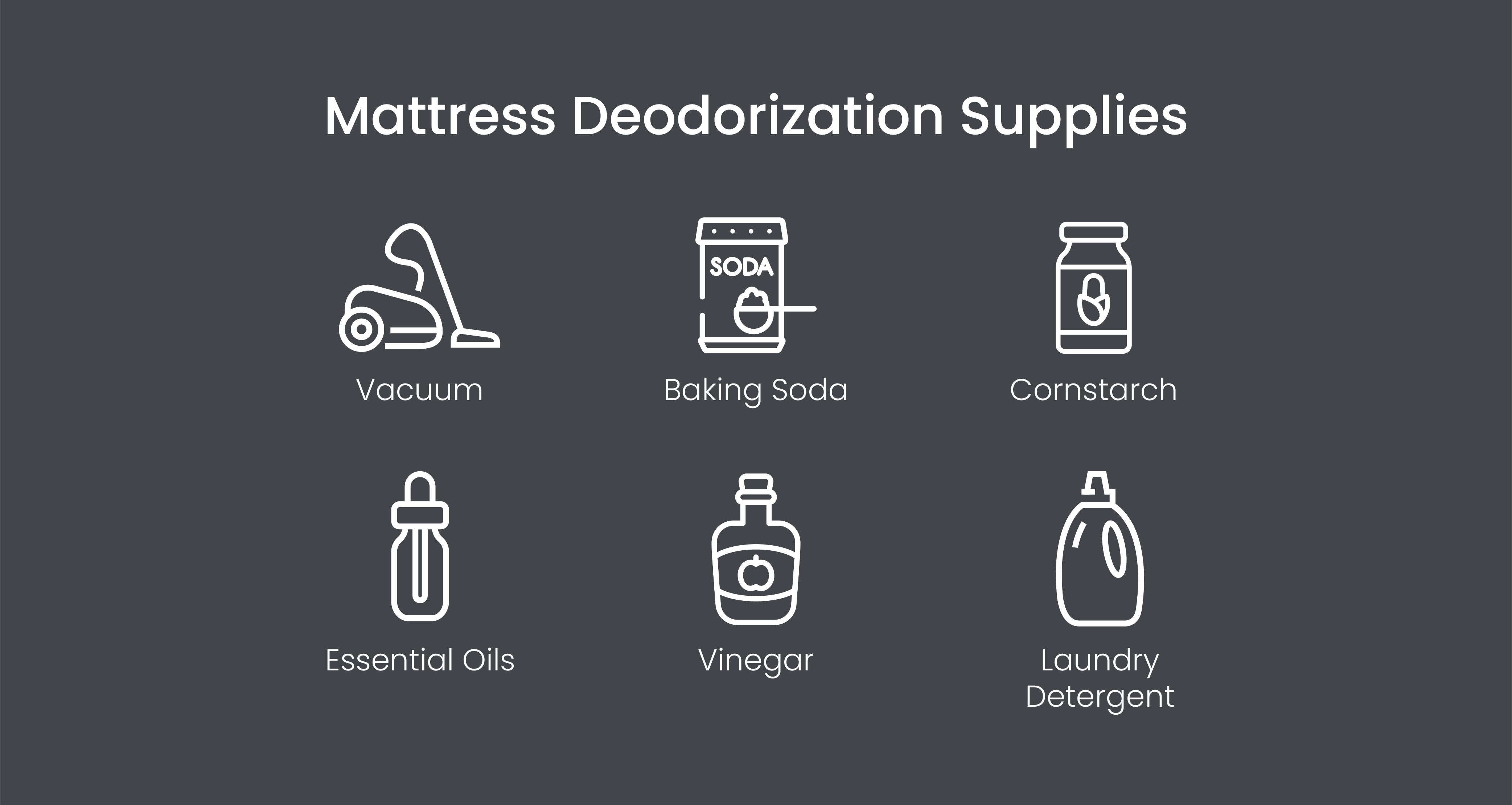
There are several techniques you can use to deodorize a mattress, and they all work relatively well and use supplies you probably have lying around your home. These include:
- Baking soda
- Cornstarch
- Vinegar
- Essential oils
- Laundry detergent
You don’t need all of these things. Instead, you can start with one and determine its effectiveness before trying something else. Once you have your supplies, it’s time to learn how to get the sweat smell out of a mattress and remove any other lingering odors.
Unfortunately, not all mattresses can be deodorized entirely because they don’t last forever. How long does a mattress last? Most mattresses last seven to ten years, so if your mattress is much older, it’s probably time to replace it.
Mattress Deodorizing Techniques
Deodorizing a mattress is simple and only requires a few supplies and your time. However, before you start, we suggest keeping children and pets in another room. While many of the supplies for deodorizing a mattress are safe for use around pets and people, some, such as essential oils, can cause respiratory symptoms and are toxic when ingested.
Of course, you can use several mattress deodorizing techniques, so choose the one that’s most convenient for you.
Baking soda
Using baking soda is one of the easiest ways to deodorize a mattress. Baking soda neutralizes odors, which is why many people keep it in their refrigerators or use it on their carpets. That said, here’s how you can use baking soda to clean your mattress:
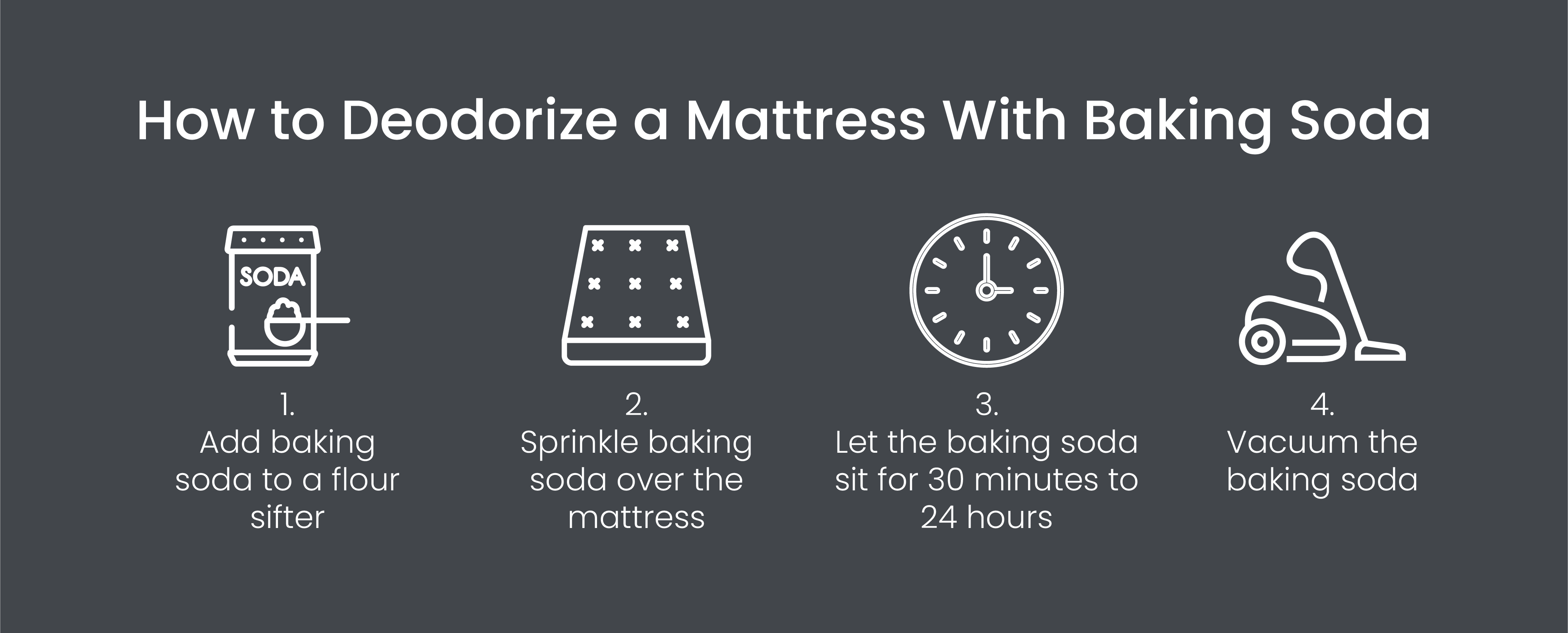
- Add baking soda to a flour sifter: A flour sifter is crucial for helping you evenly spread the baking soda over the entirety of your mattress and breaking up clumps that may have formed from moisture in the package.
- Sprinkle baking soda over the mattress: You don’t need a lot of baking soda because it’s a powerful odor-neutralizer. However, you should ensure you evenly spread it across the mattress, especially in areas emitting the odor.
- Let the baking soda sit for 30 minutes to 24 hours: Letting it sit as long as possible will help it eliminate as much odor as possible.
- Vacuum the baking soda: Always vacuum to remove the baking soda from the mattress. Since the particles are so small, you may have to do a couple of passes with the vacuum and use the upholstery attachment in nooks and crannies.
Cornstarch
Cornstarch is similar to baking soda. However, instead of acting as an odor neutralizer, it’s a powerful moisture absorber. Since moisture is often the cause of lingering odors (think sweat from your stinky shoes), eliminating moisture can help reduce odors. However, if you want to neutralize odors while absorbing moisture from sweat and body oils, consider making a cornstarch/baking soda mixture and using it exactly how you’d use the baking soda mixture.
Vinegar
Vinegar is a natural cleaner that many use around their homes instead of dangerous chemicals like bleach. However, while you may already use it to clean your coffee pot, counters, and toilet, it also makes a great mattress deodorizer. Like baking soda, vinegar neutralizes odors.
If you have a stinky mattress, you might try fabric sprays. However, these only mask the odor, whereas vinegar can neutralize it and prevent the need for harsh chemicals where you sleep. Mixing vinegar with water can remove any type of odor. However, you might be put off by the smell initially. While vinegar does have a strong smell, it evaporates quickly and doesn’t linger. Additionally, when combined with water, the strong scent is almost undetectable. Here are a few steps to follow on how to deodorize a mattress with vinegar:
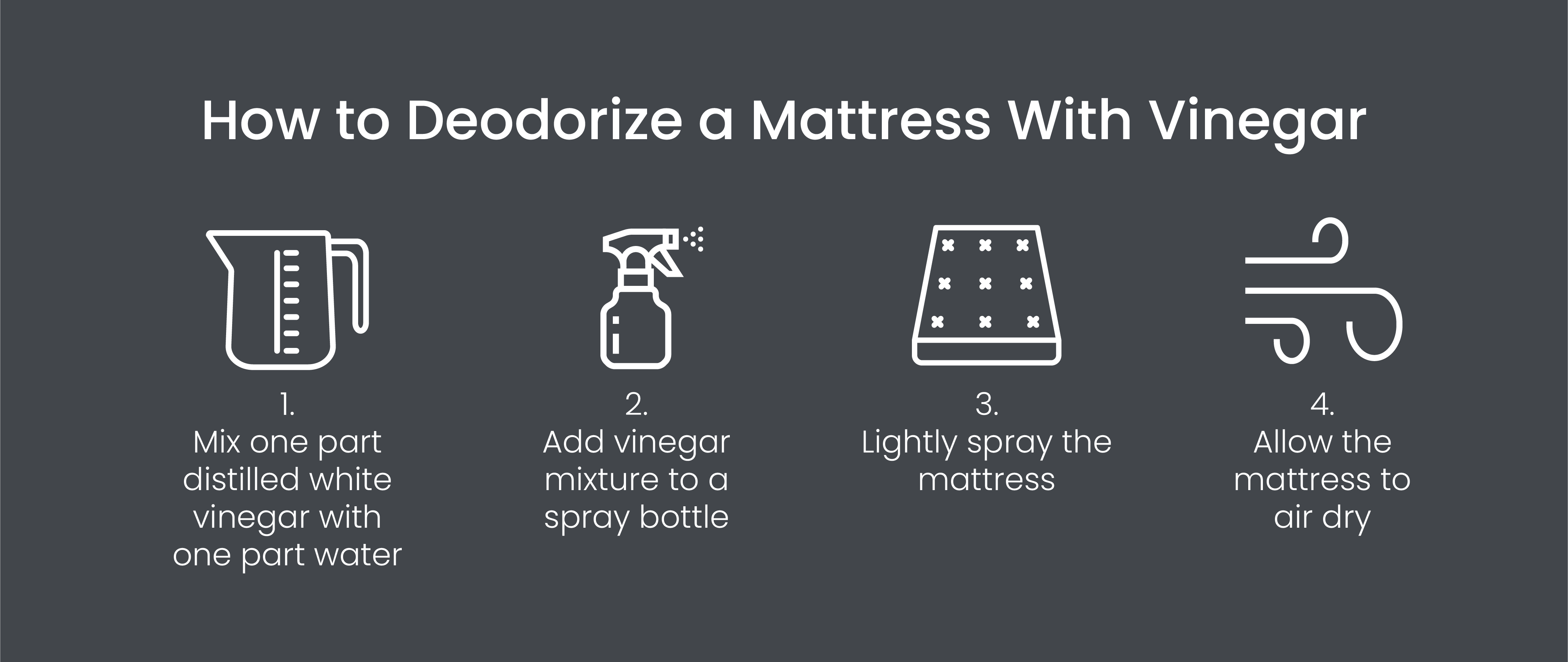
- Mix one part distilled white vinegar with one part water: White vinegar is a natural cleaner and deodorizer, but it must be diluted with water to reduce its acidity.
- Add vinegar mixture to a spray bottle: After diluting your vinegar, add it to a clean spray bottle.
- Lightly spray the mattress: Spray the solution on top of the mattress, but be careful not to spray too much so that the mattress feels wet. Instead, it should feel slightly moist.
- Allow the mattress to air dry: After spraying it, let it dry. Don’t put the bedding back on because it can trap moisture and contribute to mold growth. If possible, place the mattress in the sun or use a fan to dry it faster.
Essential oils
Essential oils are another option for deodorizing and cleaning a mattress, and many of them have antimicrobial properties that may eliminate bacteria and fungi. In addition, these oils are a good solution to add a light fragrance to your mattress. However, you should dilute the oils before using them directly on your mattress because they have strong scents. If you choose to use essential oils to freshen up your mattress, we recommend lavender, which has stress-relieving properties and may help you fall asleep faster.
There are two ways you can use essential oils on your mattress: with water or baking soda. If you use water, you can mix a few drops with water and spray the solution on the mattress. When using essential oils with baking soda, mix a few drops with baking soda and sprinkle it over the mattress.
Be careful not to use too much essential oil on your mattress because it can cause respiratory issues, especially for those with allergies or asthma. Meanwhile, if you have allergies, you might consider hypoallergenic bedding, which is resistant to common allergens like dust and dander.
When using essential oils, it’s important to note that many aren’t safe for use around pets because they have a stronger sense of smell than we do.
Laundry detergent
Laundry detergent can help you spot-clean stains and odors. However, you shouldn’t use laundry detergent on your entire mattress because moisture will sink into it, making it difficult to dry. Instead, mix it with baking soda or water to create a paste and use it to clean stains before wiping it away.
How to Maintain a Fresh-Smelling Mattress
Aim to clean your mattress at least twice a year, and in between cleanings, take the proper steps to prevent odors from affecting your ability to get quality sleep. Here are a few ways to maintain a fresh-smelling mattress and avoid deodorizing it regularly.
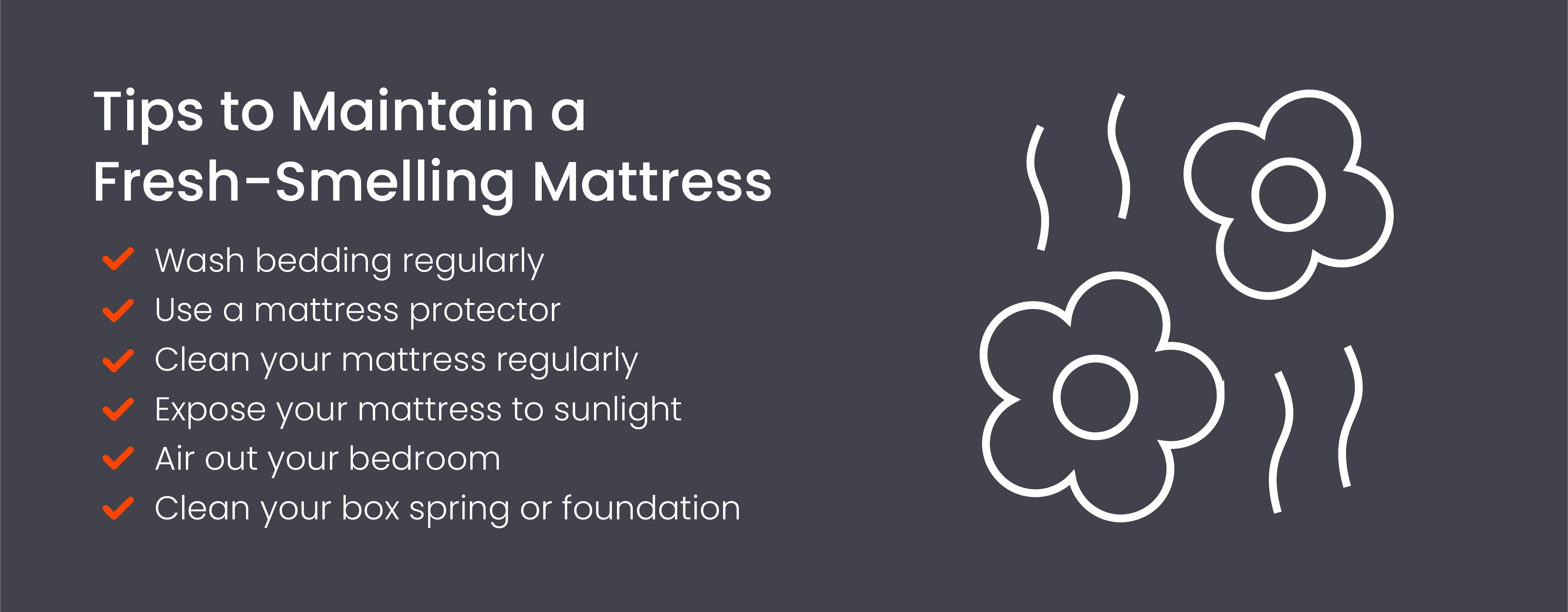
- Wash bedding regularly: Your bedding keeps you comfortable at night, but the fitted sheet protects your mattress from body oils and sweat. However, once your fitted sheet gets soiled, it allows moisture to sink into the mattress. Keeping your bedding clean will prevent this from happening and reduce odors on the mattress, but how often should you wash your sheets? We recommend washing your bedding at least once a week.
- Use a mattress protector: A mattress protector can keep the mattress itself clean and make it easier to remove odors. Instead of cleaning your mattress, you can remove the mattress protector and throw it in the wash with the rest of your bedding. That said, it’s important to note the differences between a mattress pad vs. mattress protector. A protector prevents stains, bacteria, and allergens, while a mattress pad offers more comfort.
- Expose your mattress to sunlight: UV rays are a natural disinfectant that kills bacteria. Exposing your mattress to sunlight on warm, sunny days can prevent odors and keep your mattress clean. However, avoid setting your mattress outside on too humid days because excess moisture in the air can contribute to mold growth.
- Air out your bedroom: Sometimes, all your mattress needs is a little fresh air. Airing out your bedroom allows the air to circulate, freshens your mattress, and eliminates long-lasting odors.
- Clean your box spring or foundation: While your box spring or foundation won’t absorb sweat and oils like your mattress, they can still attract dust and odors. Cleaning around your bed, even under it, can remove stains and dust that can cause musty smells.
Looking for more ways to keep your mattress clean? Read our tips for how to clean a memory foam mattress.
FAQs
What is causing my mattress to smell bad?
Mattresses absorb moisture, and in your sleep, your sweat and natural body oils rub off your body, through your sheets, and onto your mattress. This moisture and bacteria from your body can cause a lingering mattress smell. Depending on the cause of the odor, it may smell dusty or musty.
How do you get a sweat smell out of a mattress?
The best way to get the sweat smell out of a mattress is by using a baking soda/cornstarch mixture. Baking soda is an odor-neutralizer, while cornstarch absorbs moisture. Together, they work to eliminate lingering odors by drying sweat, body oils, and stains.
How do you get the smell out of a new mattress?
New mattresses sometimes emit a smell in a process called off-gassing. This process occurs when your bed is delivered and you open its packaging. Off-gassing occurs due to volatile organic compounds (VOCs), which are glasses used in manufacturing. They’re used in mattresses to make them flame retardant and ensure they meet specific safety requirements.
Luckily, off-gassing is not particularly harmful, but the smell can be unpleasant, and depending on the mattress, it can take days for the odor to disappear. Luckily, you can get the smell out of a new mattress by letting it air out by opening windows or keeping it outside in the fresh air and sun.
Wrapping Up: How to Deodorize a Mattress
Knowing how to clean and deodorize a mattress is crucial if you want to prolong its life. First, of course, you should also know how to wash pillows. Everyone sheds dead skin cells, sweat, and body oils in their sleep; eventually, mattresses and pillows can start to smell musty. In any case, all you need are a few common household products to eliminate odors and keep your mattress smelling fresh.
Of course, there are some instances where you won’t be able to eliminate an odor. For example, if you’ve had your mattress for more than ten years and it’s gone through some abuse from children and pets, it might be time to consider getting a new one. Layla’s memory foam and hybrid mattresses are resistant to odors thanks to our copper-infused memory foam that helps you sleep cooler to prevent excessive sweating. Additionally, copper is naturally antimicrobial to fight odor-causing bacteria to keep your mattress fresher for longer.

